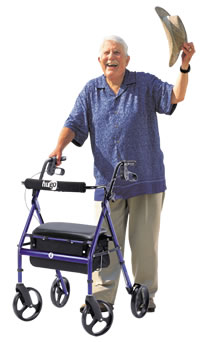
| Walker Facts |
Do I Need a Walker?
Additional considerations in choosing
a walking device
Once the best walker is selected to suit your physical status, there are many other factors that still influence the final decision.
 Answering the following questions may assist in determining the better choice.
Answering the following questions may assist in determining the better choice.
1. What is the primary purpose of
the walker?
- To increase independence in daily activities (toileting, bathing, in/out of bed)?
- To improve mobility in the home?
- To improve community access?
- To improve competitive employment?
- To improve safety?
- To improve limited breathing ability?
- To improve exercise tolerance?
2. Do I need a walker on a temporary or a permanent
basis?
3. Can I learn to use a walker safely, and consistently
apply the new knowledge?
- Maybe I should choose a simple walker with few accessories and limited moving parts?
4. Where will I use the walker?
- Small spaces vs. large spaces: Do I have the space to turn a large walker? What about the space beside your bed, in front of your fridge, in the bathroom? Can my walker fit through doorways?
- Stairs (inside, outside): Do I need a lightweight walker to carry up and down stairs? Do I need a second walker? Do I live with someone who can help me carry the walker?
- Carpeting: Can I move my walker over the carpet?
- Obstacles vs. clear pathways which I may encounter.
- Parking (inside, outside, distance): Are there any barriers between where I park or where I get in and out of a car and my home?
- Transportation (independent driver, family or friends drive, community transportation for people with disabilities, or taxi/public transportation): Will my walker fit my mode of transportation? Can I lift it into my vehicle if I’m alone?
- Do I need a seat built into my walker if distances are longer than I can walk?
- Is the walker used predominantly indoors or outdoors? Indoor use allows for the purchase of lighter and smaller frames. Outdoor use requires the purchase of walkers with locked frames, heavy duty components and better quality casters.
5. Social Supports
- If I live alone: Do I need to choose a walker that provides more stability because I’m alone?
- Community Supports: Who can help me? How available is my help? – 24 hours a day, a few hours a day, a few hours a week. Consider family, friends, publicly funded help, and privately paid help.
- Financial situation: Can I afford the walker that I need? Standard walkers are less expensive and more available second hand. Do I have insurance coverage or government assistance or can I access charitable assistance?
Do I need a therapist to buy a walker?
Choosing the Right Walker
You’ll need to consider much more than physical ability.
What about the environment and social supports?
Do You Need a Therapist?
And if so, how do you find a therapist?
We have a number of associations you may contact.
Where to Purchase a Walker
You have options and we have recommendations.
There is also financial assistance available to you.
Using a Walker Safely
From basic activities to common mistakes, here’s a guide to help you use your non-wheeled walker or wheeled walker safely and effectively.
Frequently Asked Questions
Commonly given answers. Feel free to contact us if you’d like to contribute and help others.
Case Studies
Professionally prepared resources that offer guidance to a successful thought process based on past experiences.
Sponsors
Many thanks to these companies for sponsoring Walker Facts. It's their support that keeps this resource free to everyone.





